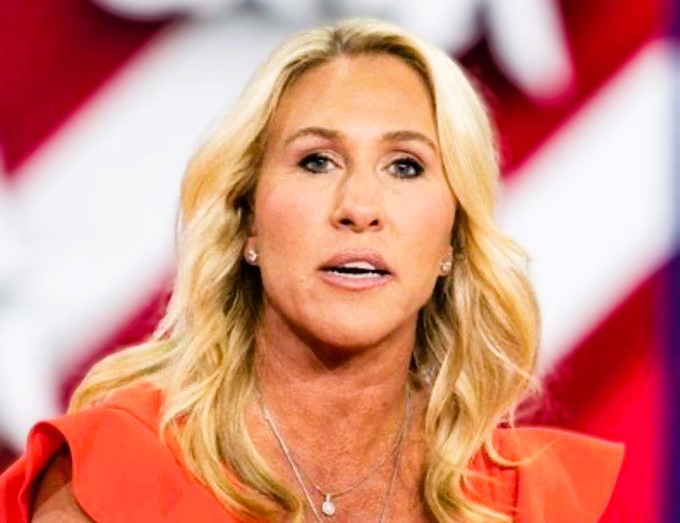
In a political landscape often dominated by fierce partisanship, it’s rare to see someone from one party publicly defend a prominent figure from the opposing side. However, U.S. Representative Marjorie Taylor Greene, a staunch conservative and vocal supporter of former President Donald Trump, recently surprised many by condemning racist tweets directed at Vice President Kamala Harris. Greene’s remarks have sparked conversations about race, politics, and the need to combat discriminatory rhetoric, even across party lines.
Greene’s Stance on Racism
Marjorie Taylor Greene, known for her outspoken and often controversial views, made headlines when she denounced a series of racist tweets aimed at Vice President Harris. While Greene has not been one to shy away from sharp criticism of the Biden administration, she was quick to condemn the use of racial slurs and bigotry in political discourse.
Marjorie Taylor Greene’s condemnation came after a series of tweets emerged, targeting Harris with offensive language related to her race and gender. The attacks included derogatory references to her South Asian and African American heritage, prompting widespread backlash from both Democrats and Republicans. Greene, in a rare moment of bipartisan solidarity, took to social media to call out the tweets as “vile” and “unacceptable.”
In a tweet addressing the situation, Greene wrote, “No matter how much I disagree with Kamala Harris politically, racism has no place in our discourse. Attacks on her race and ethnicity are despicable and should be condemned by all Americans.”
Why Greene’s Comments Are Significant
Marjorie Taylor Greene is a polarizing figure within American politics. Known for her support of conspiracy theories, opposition to progressive policies, and combative style, she has often been a lightning rod for controversy. However, her decision to speak out against racism, even when directed at a political opponent, is noteworthy.
Greene’s comments highlight a broader issue within American politics—racist rhetoric and the normalization of hate speech. While politicians frequently engage in heated debates, the line between policy disagreements and personal attacks is often blurred. Greene’s decision to condemn the racist tweets shows a recognition that some attacks go beyond politics and strike at the core of human dignity.
Furthermore, Greene’s statement sends a message to her supporters. By publicly denouncing racism, she is signaling that political opposition should not be rooted in hatred or bigotry. This is especially important considering her influence among conservative voters. For many, her words may serve as a reminder that while political discourse can be passionate, it should never devolve into discrimination.
The Response from Both Sides
Greene’s comments were met with mixed reactions from across the political spectrum. Many Democrats, while skeptical of her past rhetoric, praised her for taking a stand against racism. Some saw her statement as a rare instance of putting country over party and called on other Republican leaders to follow suit.
Representative Alexandria Ocasio-Cortez, a frequent critic of Marjorie Taylor Greene, acknowledged the significance of her comments, tweeting, “While we have our differences, I agree with Marjorie Taylor Greene that racism has no place in our society. We should all work to root out hate, regardless of where it comes from.”
On the other hand, some on the far-right criticized Greene for her remarks, accusing her of abandoning conservative principles. These critics argued that by condemning the tweets, Greene was pandering to the left and undermining her credibility as a hardline conservative. Some even took to social media to accuse her of betraying Trump’s base, a claim that Greene quickly dismissed, reaffirming her loyalty to conservative values.
The Broader Conversation on Race and Politics
Greene’s condemnation of racist tweets against Harris comes at a time when race continues to play a central role in American politics. As the first female, Black, and South Asian Vice President, Kamala Harris has often found herself at the center of discussions on race and identity. Throughout her political career, she has faced both praise and criticism, much of which has been influenced by her background.
The racist tweets that Marjorie Taylor Greene condemned are not isolated incidents. Politicians of color, particularly women, are often subject to online abuse rooted in their race and gender. Greene’s remarks are a reminder that this kind of rhetoric is harmful not only to the individuals targeted but to the fabric of American democracy.
Moving Forward
While Marjorie Taylor Greene’s defense of Kamala Harris may seem unexpected given their stark political differences, it underscores the importance of standing up against racism, regardless of party affiliation. Her remarks have sparked important conversations about the need for civility in political discourse and the responsibility of public figures to denounce hate speech.
Marjorie Taylor Greene’s comments may not signal a shift in her broader political stance, but they serve as a reminder that some issues transcend politics. Racism and bigotry have no place in any society, and it is the duty of leaders on both sides to condemn them when they arise. As the conversation around race in America continues to evolve, Greene’s remarks stand as a rare moment of unity in an otherwise divided political landscape.
